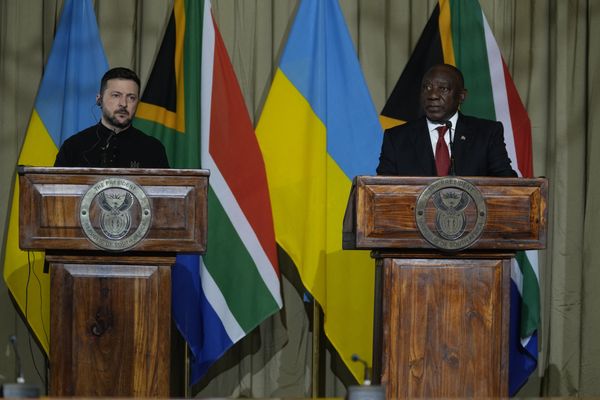
When Mark Bullingham was asked whether it was time Sarina Wiegman had a statue, a relaxed Football Association chief executive said with a smile: “She can have whatever she wants, she’s incredible.” He went on to outline that wheels are in motion for a statue outside Wembley to commemorate the Lionesses’ historic Euros win, though it will be a team tribute, rather than an individual one.
Wiegman can’t quite have whatever she wants, though. Pay equity with the England men’s manager, Gareth Southgate, is not on the cards anytime soon, despite her superior record and the FA’s desire to paint the sides as of equal value. Southgate is reportedly paid £5m a year, a significant uplift on Wiegman’s supposed £400,000 salary.
Bullingham, asked what the men’s side could learn from Wiegman’s rapid success, said: “I know a lot of people put one over the other, but we don’t. They work brilliantly together in the One England concept.”
On whether Wiegman could be a potential replacement for Southgate, Bullingham was similarly positive but dismissive of anyone implying the men’s job would be a step up. “Sarina’s doing the Lionesses and we think it’s critical she does that job and she’s doing a brilliant job. We don’t like suggesting the men’s team is above that. Some people do.”
Bullingham and the FA talk a good talk about valuing the roles equally, so why won’t the governing body put its money where its mouth is? Wiegman has won the Euros with England and will lead them into Sunday’s World Cup final against Spain. She guided the Netherlands to victory at the Euros in 2017 before taking them to the World Cup final in 2019. Southgate led England to the 2018 World Cup semi-final in Russia, the quarter-finals of Qatar 2022 and the Euro 2020 final.
Bullingham’s justification for the salary discrepancy was to point to the different size of the market for managers. “Over time, that’s where you’ve got to get to,” he said of equal pay. “If you look at the disparity in the market and the income coming in, that’s why you’ve got a difference.

“We don’t talk about people’s remuneration. I would say that Sarina is, within the market she operates within, well-paid.”
The problem is, with salaries, sponsorship deals and broadcast contracts in the men’s game seemingly ever-inflating, closing the gap in income and revenue is, if even possible, going to take a long time and a lot of investment.
Bullingham hopes the viewing figures for the Lionesses can translate into broadcast revenue and commercial revenue and says the bigger issue is in the club game. Waiting for the gap in the market to close is not the answer though; forcing it closed is.
Investment can drive change. Just look at the NWSL club Angel City FC. The team were launched with millions of dollars of investment by some of the biggest female names in business, sport and entertainment. The club is now valued at more than $100m (£78.5m). Angel City paid between $2m and $5m to join the NWSL. A new club based in San Francisco’s Bay Area has committed to a $53m expansion fee to join in the coming years.
Yes, this is a very different set of circumstances, but the principle is the same. The Angel City founders didn’t look at the existing investments into the women’s teams of clubs around the world and come in at that level; they came in way above and drove the change. They have secured more than $50m in sponsorship deals, with 10% of every deal going into community projects. That approach has attracted more sponsors.
Bullingham was right to say the FA is a not-for-profit body when it was pointed out it would be a huge statement to be the first federation to pay its women’s and men’s managers the same. “If we take money from one area it then has to come off another,” he said. “I can’t tell you the list of great ideas we get every week for things, some of which are in women’s football, some are in para football, some of which are men’s football, some of which could be building more pitches for kids.
“We have an endless list of things and while some people look at our revenue and say that’s a great number I promise you that if you are sat in our chair with all the things you want to do, it’s never enough.
“I understand the point and I want to continue building up her salary and that is the long-term objective. But if you were to do that now, you would have to be taking money from somewhere else.”
However, if England were to pay its men’s and women’s managers the same, that would probably be a driver of commercial revenue. Sometimes, you have to be a market leader.
Win the World Cup and her head could be turned by a new challenge. Already, the vultures are circling, with the USA having parted ways with Vlatko Andonovski and fans looking longingly at Wiegman. Want to keep her? Make the world’s best women’s football manager one of the best-paid managers in football, not just women’s football.







